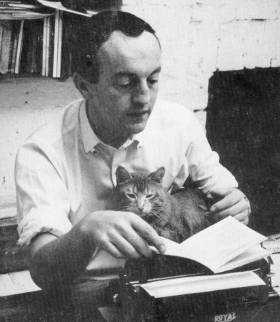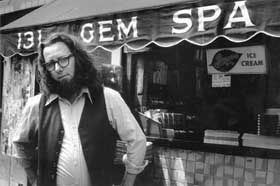In Which You Become Even More Literate Than You Already Are
 Thursday, June 18, 2009 at 4:59PM
Thursday, June 18, 2009 at 4:59PM 
The Cat’s Just Fine He Never Left
by Will Hubbard
It is true, as Charles Simic says at the beginning of his review of The Collected Poems of Robert Creeley, that publishers’ recent affinity for printing elegantly bound, thousand-page editions of a single 20th century poet could make for some tedious reads.
Perhaps it all began with Donald Allen’s brilliantly edited Collected Poems of Frank O’Hara, which at 560 pages still managed to garner the National Book Award for 1972. The sheer magnitude of O’Hara output before his death at age 40 never ceases to astound me, and his Collected is a book that, because of its variousness, breadth, and complexity, I can open at random and always find something striking, something new. For me, a book that contains everything a person wrote in one mode takes on a holy aura, and like any holy book, I would never question its size.
More practically, it seems clear that just as libraries periodically bind together multiple editions of popular magazines, these mammoth Collected editions are a way to preserve and provide useful point of reference to a complex and varied matrix that, more and more, is a poet’s life’s work. With Ezra Pound’s “only the quality of the emotion endures” in mind, I am probably not alone in thinking that time, or more precisely the evolution of manners and usages of language in time, is the best and only reasonable filter of a writer’s varied output.

young dusan simic
After his initial thoughts on publishing trends, Simic, the newly anointed Poet Laureate of the United States, moves into a less venomous than simply dismissive review of Robert Creeley’s two volume Collected Poems, the second volume of which was published last year by the University of California, about a year after the poet’s death in 2005.
While lauding the “wild, pure, original voice” of Creeley’s first major collection For Love, Simic goes on to call his next book Words “uneven”, and everything in and after his next collection, Pieces, “colloquial speech… conceal[ing] a paucity of content”, and in a final convenient and familiar critical missive, “ideas about poetry confused with poetry itself.”
While actually providing useful impressions of For Love and Creeley’s ideas about poetic consciousness, Simic dismisses the ten-part poem “A Step” in Pieces as a crass interpretation of Kerouac’s “an undisturbed flow of the mind,” conveniently reproducing only the poem’s first three parts and calling them “slight." I have personally always loved “A Step”, and thus reproduce it here in full:
A Step
Things
come and go.
Then
let them.
Having to—
what do I think
to say now.
Nothing but
comes and goes
in a moment.
*
Cup.
Bowl.
Saucer.
Full.
*
The way into the form,
the way out of the room—
The door, the hat,
the chair, the fact...
*
Sitting, waves on the beach,
or else clouds, in the sky,
a road, going by,
cars, a truck, animals, in crowds.
*
The car
moving
the hill
down
which yellow
leaves
light forms
declare.
*
Car coughing moves with
a jerked energy forward.
*
Sit. Eat
a doughnut.
Love’s consistency
favor’s me.
*
A big crow on the
top of the tree’s
form more stripped
with leaves gone
overweighs it.
Pieces of cake crumbling
in the hand trying to hold
them together to give each
of the seated guests a piece.
*
Willow, the house, an egg—
what do they make?
Hat, happy, a door—
what more.
A friend wrote me recently, excited by this very poem, saying it clarified for him the Creeley quotation--form is never more than an extension of content--in Charles Olson’s famed essay on poetics, “Projective Verse”.

It is 4:23 a.m. and I am reading my poems to a cat
My friend's letter went on to characterize “A Step”, I think quite aptly, as an “instruction in wonder”. There is a real sense in which two simple stanzas like “The car/ moving/ the hill/ down// which yellow/ leaves/ light forms/ declare” instructs the reader how to both view a striking image and speak of it in a way that is equally striking.
The syntax of a phrase like “which yellow leaves light forms declare” would be at home in Shakespeare, yet Creeley’s insistence on the short line, in disjointing the phrase, does far greater justice to the sheer sensual complexity of such an utterance. It is as much lexical archaeology as it is word play, and in this sense satisfies William Carlos Williams’ injunction to contemporaneity, make it new.

The educative aspect of Pieces, however, offends Simic: “Creeley…bec[a]me a teacher-preacher type giving us classroom demonstrations of how poetry, written according to a particular theory of poetry, works.” Though I enjoyed the pleasure of actually being a student of Robert Creeley’s, I don’t think any student of poetry (which Creeley considered himself to be all his life) would object to a lesson in prosody as beautiful as the following two quatrains toward the end of “A Step”:
A big crow on the
top of the tree’s
form more stripped
with leaves gone
overweighs it.
Pieces of cake crumbling
in the hand trying to hold
them together to give each
of the seated guests a piece.
Though Simic admits to wanting from Creeley “more nicely observed details and memorable stories,” the stanzas above exhibit an attention to detail unattainable by more ornamented language precisely because they recreate the space and movement of the images through syntax rather than static sensual detail.
The image of the crow in the first quatrain seems literally to weigh down lines that follow it, squeezing them into a sort of anxious inarticulateness until the action of weighing down is itself described. The futility of material manipulation described in the second quatrain is evoked in the crumbling syntactic patterning of the lines themselves.
Both strategies seem to meet (or greatly exceed) Simic’s call for ‘nice observation’, and both avoid the ostentation of excessive adjectives and long descriptive passages.

The Doctor William Carlos
William Carlos Williams, a great mentor to Creeley, is the only man in history to decline the Poet Laureateship of the United States. Williams’ letters of the time demonstrate an extreme ambivalence to the position and anything it could supposedly mean to ‘represent’ American poetry. Charles Simic, however, has accepted the charge with open arms, to be, as the Library of Congress states, “the nation's official lightning rod for the poetic impulse of Americans….to raise the national consciousness to a greater appreciation of the reading and writing of poetry.”
It is difficult to understand, by any measure, how that job description could include rather indelicately undercutting the life’s-work of a recently deceased colleague who, as even a brief perusal of the back cover of his most recent book will attest, was admired if not revered by countless of the last 50 years' most important practitioners of the art form.
If anything a poet should be attentive, and I question the motivations of any poet, let alone a Laureate, who could approach the life’s work of a friend and colleague with as much inconsiderate and simplistic rhetoric as Simic in his evaluation of Robert Creeley.
I recently asked the poet Philip Levine if there were any Robert Creeley books that he particularly liked, and immediately he said “Later,” adding after a moment’s pause, “and of course For Love, that’s where we all get in.”

How could Lowell not love this guy?
It was heartening to hear Levine, whose work is vastly different from Creeley’s, have the tact to show appreciation for an artist in whom I, his student, clearly had a vested interest. This was advocacy, in its most elemental sense, because my world of poetry expanded in that moment — a connection despite difference was formed. In dismissing Creeley’s later books, Simic seems primarily interested in constricting the public’s understanding of how and why poetry can function. And this, above all, should terrify us.
Will Hubbard is the contributing editor to This Recording. A graduate student in the poetry program at New York University and editor-in-chief of CapGun Magazine, he lives in Williamsburg.

YEAH IT'S OVERWHELMING WHAT ELSE CAN WE DO? GET JOBS IN OFFICES AND WAKE UP FOR THE MORNING COMMUTE
"On Almost Any Sunday Morning" - Counting Crows (mp3)
"Sundays" - Counting Crows (mp3)
"Hanging Tree" - Counting Crows (mp3)
"We're Only Love (demo)" - Counting Crows (mp3)

ANOTHER CREELEY POEM TO ENJOY
The Warning
For love—I would
split open your head and put
a candle in
behind the eyes.
Love is dead in us
if we forget
the virtues of an amulet
and quick surprise.
PREVIOUSLY ON THIS RECORDING
Will took 17 mg with Ted Berrigan.
Will used Cesare Pavese as a catapult.
Will takes Gertrude Stein out for a spin.































Reader Comments (7)
can i get a photo credit?
"YEAH IT’S OVERWHELMING WHAT ELSE CAN WE DO? GET JOBS IN OFFICES AND WAKE UP FOR THE MORNING COMMUTE"
Reason number 1,000 why I hate MGMT
I think that Simic's criticisms of Creeley's later work are not original to him, certainly, nor are they meant to be dismissive as much as to counteract the cult of personality built around the author – that kind of aggrandizement which skews an analysis of the work: something far more terrifying the conversation-topic-producing opinion of a single poet.
While I disagree somewhat with the dismissive tone of Simic's Creeley statement, it doesn't in the least surprise me. Simic's allegiences have been clear for a long time, and they are quite distinct from Creeley's.
It is by now very much a cliche to make the observation that Creeley underwent some kind of about-face in the early 1970's, turning, after Pieces and A Daybook, away from strict minimalism, towards a more relaxed form that the contextualized 'Sixties "permission" had implied (he could now eat the cake). This has parallels in his life, with the break-up with Bobbie and the marriage to Penelope etc.
And yet he continued to publish tight, constricted poems right through to the end, right alongside those looser quatrains.
Simic is really just impatient with the poems in Words and Pieces, which is predictable and tiresome. Ironically, Simic's own faux-primitivistic earlier work (in Dismantling the Silence etc.) depends to some degree on a pared-down simplicity and reductive "universals"--without specificity or context. Those early poems don't seem to be "about" anything except a vaguely imagined provincial crudite (fr.) of Central European character, reminiscent of Jerzy Kosinksi.
I find it odd for someone to talk about Creeley's "cult of personality" since the whole thrust of RC's work seems to be against the idea of a confessed/confessional persona invested with fictionalized or publicized qualities. That accusation could much better be made about someone like Bly, or Dickey, or Ginsberg, or Plath (all contemporaries of Creeley's generation). Some poets (and writers) pray for a public personality: Certainly publishers do. But Creeley? That's idiotic.
[...] The Cat’s Just Fine He Never Left [...]
[...] Will and Charles Simic duel. [...]
1.isnt 'make it new' pound's quote?
2.this site, which i found thru sillimans blog, is Really Really great. thanks.